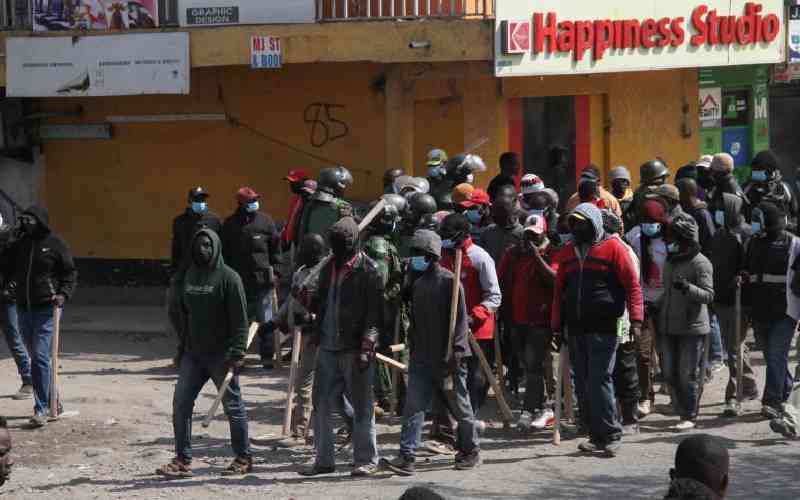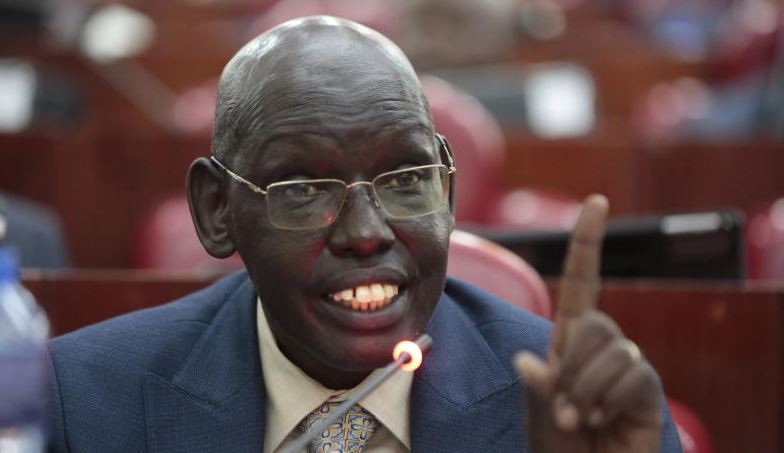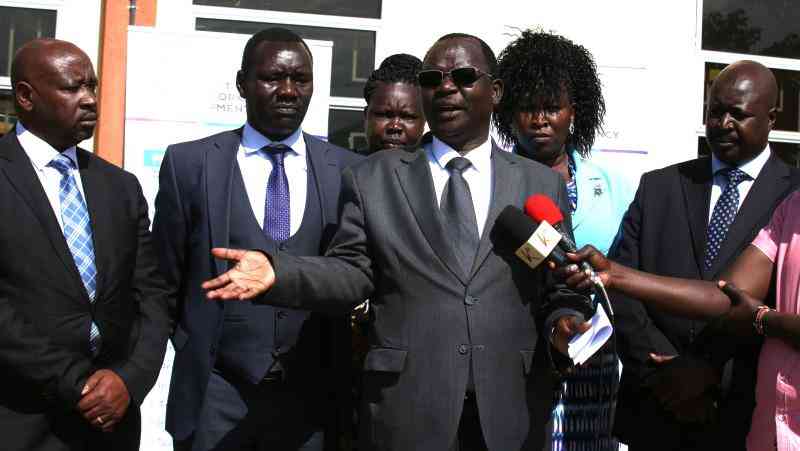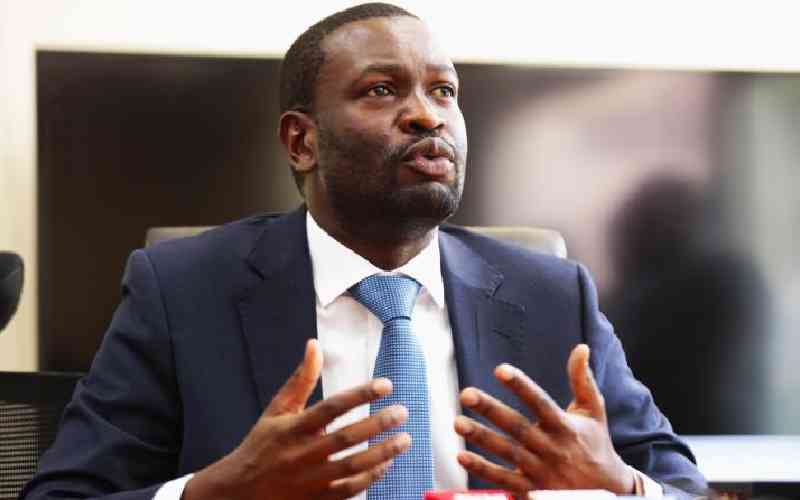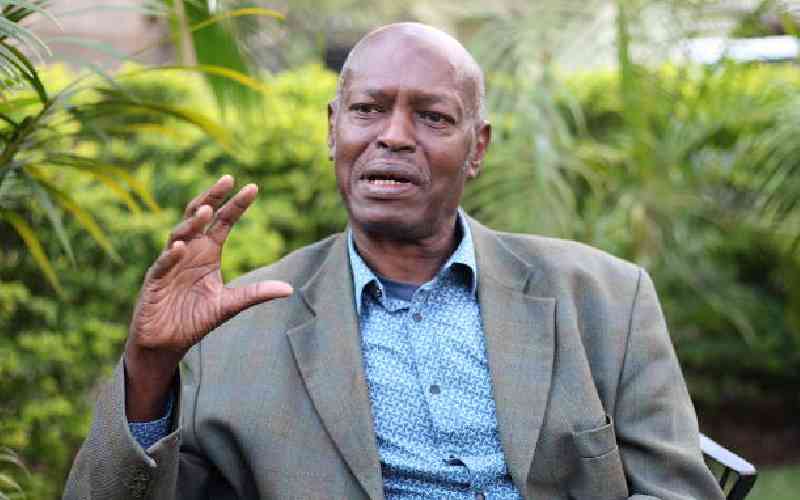This week, national security agencies threatened to take the country back to an era, which most Kenyans thought was firmly behind them with the passing of the Constitution.
Inspector General of Police David Kimaiyo banned, at least for a few hours, political rallies across the country, thus recalling a time when police routinely banned opposition political gatherings.
In a move that calls to mind the days of the dreaded special branch, a civil servant was charged in a Lamu court after an intelligence officer secretly taped him allegedly bad-mouthing President Uhuru Kenyatta in a bar.
But it was Kimaiyo, who has now made news for all the wrong reasons over the past one month with his controversial directives, which set the political field afire this week.
The IG recently said he had banned all political rallies for undisclosed security reasons prompting protestations from Jubilee and the Opposition, CORD.
Although Kimaiyo explained that his decision was taken for security reasons, a cross-section of Kenyans pointed out that he had no powers to cancel such meetings since freedom of assembly is enshrined in the Constitution.
“The situation might have been different had he explained the nature of the security threat to the events organisers’, but his announcement seemed a fiat,” said Benard Tuta, an independent security expert.
Ban on rallies
The directive called to mind the old days in Kenya’s political history when the police and provincial administration routinely cancelled Opposition political rallies for all manner of reasons.
His action prompted angry reactions from CORD Coalition, which held a rally yesterday to welcome back its leader Raila Odinga from a two-months US tour.
In an interview with a local TV station, Kimaiyo seemed to suggest that there might have been other considerations for the ban when he said, “it is time for development and not politicking”. For as long as Kenya has been an independent nation, the police force has routinely been misused by those in power to achieve personal and partisan political ends.
Fearing the public might misconstrue Kimaiyo’s utterances as having been instigated by Jubilee, State House moved swiftly to distance itself from Kimaiyo’s directive.
“Once again, he totally went off the rails. It is not in his place to decide when and where politicians should meet. His work is to provide adequate security and let politicians politick,” said Tuta.
Media reports say Kimaiyo was prevailed upon by President Uhuru to do an about-turn and lift the ban on the rallies, barely 12 hours after he had issued the edict.
Stunning example
Stay informed. Subscribe to our newsletter
However, critics questioned how independent the office of the IG is from Executive control. In execution of the mandate of the office, the IG is constitutionally not supposed to take instructions from any other quarter.
“Kenyans today see in Kimaiyo the police commissioner of yore who was more of a tool of the Executive,” said George Musamali, the director of Centre for Risk Management in Africa.
“When it is reported that he took the decision at the behest of the President, the insinuation is that he takes instructions from other quarters, be they the Government’s or even the opposition” he said.
However, Tuta argued that although Kimaiyo’s office is in theory independent, in practice he works with other institutions, but nonetheless needs to project the image of an independent force.
“I am not saying he should operate oblivious of facts on the ground, but it is a different matter when his cumulative actions create the impression that he favours one side of the political divide,” Tuta said.
This was not the first time that Kimaiyo was issuing statements whose legality have been called to question or which have been turned into satirical news items.
Almost a month ago, Kimaiyo issued a directive banning tinted windows on all vehicles, even though the law bans such only on Public Service Vehicles.
A majority of Kenyans pointed out that his move was unconstitutional, but Kimaiyo stubbornly stood his ground even as his officers harassed hundreds of innocent motorists.
In another stunning example of Kimaiyo overreaching his mandate, he threatened to arrest and prosecute journalists over their coverage of the Westgate rescue operation in October last year.
He accused journalists of “provoking propaganda” and inciting Kenyans against the authorities with investigative stories, which exposed command confusion during the operation.
Mombasa Senator Hassan Omar Hassan said Kimaiyo “was nostalgic about the imperial police commissioner of yesteryear. He has totally, failed to internalise the sweeping changes that the Constitution brought about to the police service.”
Some of Kimaiyo’s statements have been turned into satirical news items while social media has had a field day turning them into memes that poke fun at the IG. Tuta said Kimaiyo has often unnecessarily exposed himself by failing to delegate some of the functions of his office to junior officers.
“I would like to see him delegate more responsibilities including that of issuing public statements to his spokespersons and two deputies and limit himself to policy matters,” he said.
In January, Kimaiyo’s tweet that an explosion at Jomo Kenyatta International Airport had been caused by a light bulb, which fell down, became the butt of jokes in social media. He was forced to eat his words the next day when it became apparent that the explosion was caused by a device that had been carefully planted.
Media criticism
“He should delegate tactical operations to his juniors. In that way, he will avoid making some of these embarrassing statements,” said Tuta.
However, Jubilee political activist Moses Kuria came out defending the IG, saying that Kimaiyo “should be judged by his actions and not his utterances”.
“He has taken over an institution that was riddled with a lot of problems. He needs to come out and defend the service, but when he does so, the media often criticises him unfairly,” he said.
Besides, critics of the National Intelligence Service have always accused it of expending much of its attention and resources to fighting political battles on behalf of the Government.
And now they most likely have proof of it. This week a civil servant with the Kenya Forest Service in Lamu County was charged with insulting President Uhuru.
Though details remain scanty about the incident, police have charged David Avude for allegedly making unsavoury remarks about the President in a bar.
Spy network
An intelligence official allegedly recorded his conversation, thus recalling the old days when Kanu effectively used the dreaded Special Branch to spy on its citizens.
So pervasive was the spy networks that Kenyans thought twice before freely speaking out their minds about their government and its leaders in public and even private spaces for fear that “big brother” was watching.
While there is no reason to believe that the old days of Special Branch are back, it is instructive to note that this is the second person in less than a month to be charged for allegedly insulting the President in public.
Last month Samuel Apoko, an MCA from Kisii County, found himself on the wrong side of the law after he allegedly spoke disparagingly of President Uhuru in a public rally.
Omar said this trend is worrying. “Security officials are getting in ordinary citizen’s private spaces more and more. This is not what Kenyans deserve,” he said.
 The Standard Group Plc is a
multi-media organization with investments in media platforms spanning newspaper
print operations, television, radio broadcasting, digital and online services. The
Standard Group is recognized as a leading multi-media house in Kenya with a key
influence in matters of national and international interest.
The Standard Group Plc is a
multi-media organization with investments in media platforms spanning newspaper
print operations, television, radio broadcasting, digital and online services. The
Standard Group is recognized as a leading multi-media house in Kenya with a key
influence in matters of national and international interest.
 The Standard Group Plc is a
multi-media organization with investments in media platforms spanning newspaper
print operations, television, radio broadcasting, digital and online services. The
Standard Group is recognized as a leading multi-media house in Kenya with a key
influence in matters of national and international interest.
The Standard Group Plc is a
multi-media organization with investments in media platforms spanning newspaper
print operations, television, radio broadcasting, digital and online services. The
Standard Group is recognized as a leading multi-media house in Kenya with a key
influence in matters of national and international interest.


